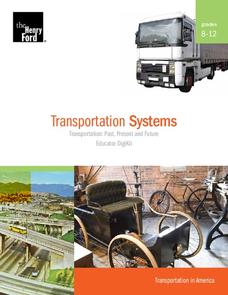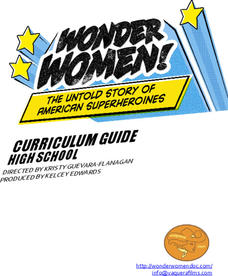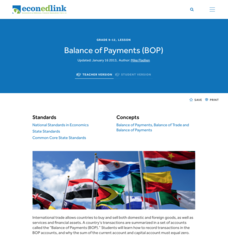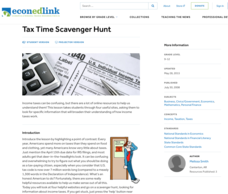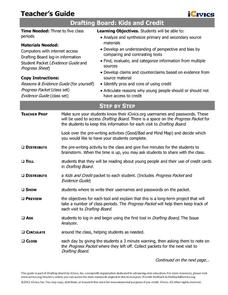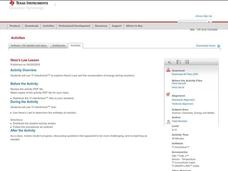Echoes & Reflections
The Children and Legacies Beyond the Holocaust
Using video testimony, primary source documents that detail international agreements, and structured discussions, learners consider the precarious position of children during the Holocaust and other international conflicts, and how to...
Henry Ford Museum
Transportation Systems
Learners analyze the evolution of cultural attitudes through the lens of transportation, examining several artifacts, documents, and photographs. Topics covered include how American attitudes have influenced society's evolution into a...
Vaquera Films
Wonder Women - The Untold Story of American Superheroines: High School Curriculum Guide
A 41-page curriculum guide tells the story of the untold stories of American Superheroines! Divided into three modules, the guide is designed to be used before, during, and after viewing the 2012 documentary Wonder Women! The Untold...
National Endowment for the Humanities
Treaty Negotiations
Let's make a deal! Drawing on work in previous unit lessons, young scholars negotiate favorable trade treaties with other nations during the early Modern Empire Era. Their work relies on previously completed activities, as well as...
National Endowment for the Humanities
Planning for Treaty Negotiations
The party is over. Now it's time to get to work! Learners acting as agents for a country during the modern Age of Empires develop proposals to negotiate trade deals between the rising global powers. Using research from previous lessons,...
National Endowment for the Humanities
Hosting a Diplomatic Reception
The toasts are written, the table is set: it's time to party! Young scholars use a role-playing activity to go toast to toast. After researching and writing toasts for their allied countries during the modern Age of Empires, individuals...
National Endowment for the Humanities
Writing a Diplomatic Toast
Here's to you! Using a role-playing activity and primary source analysis, learners discover the importance of diplomacy. Impersonating a diplomat from a great empire, they write a toast to another empire, analyzing the strengths and...
National Endowment for the Humanities
Analyzing “Intercepted Intelligence”
A good diplomat needs to know how world events can affect their country. First, class members examine the Papal Bull that excommunicated Queen Elizabeth I from the Roman Catholic Church. Then, learners playing the role of diplomat from...
National Endowment for the Humanities
Empire Intelligence Briefings
To trade or not to trade. Young diplomats put their country's best foot forward in a series of briefings for other countries about their nations. The goal is to persuade others to engage in diplomacy and trade. Using a previous lesson...
National Endowment for the Humanities
Learning about Early Modern Era Empires
You are a diplomat during the Age of Empire: prepare a briefing about your country. Young scholars take on the challenge using a role-play exercise to examine various empires during the rise of global interconnectedness. Materials...
Council for Economic Education
Balance of Payments (BOP)
Have you ever checked your clothes to see how many nations created them? Pupils take a deeper look at international trade and the balance of payments nations have with one another. They use calculations, simulations, and primary sources...
Council for Economic Education
Tax Time Scavenger Hunt
Is a 1040EZ tax form really easy? Scholars investigate the complexities of the United States taxation system with an economics lesson. Using a wide variety of web sources, they interpret IRS taxation rules and regulations to better...
PBS
Evolution of the Presidency: Theodore Roosevelt to Franklin D. Roosevelt
How much power should a president be allowed to exert? Theodore Roosevelt and Franklin D. Roosevelt exercised their power according to their interpretations of the United States Constitution, and these interpretations affected the...
Channel Islands Film
Island Rotation: Lesson Plan 4
Foster's Rule? Allopatric speciation? After watching West of the West's documentary Island Rotation, class members use Venn diagrams to compare endemic species on the Channel Islands with mainland related species. They then create a...
Curated OER
Identifying Economic Systems
Young historians practice identifying evidence to categorize a particular country's economic system as either a mixed, centrally planned, traditional, or free economic system in this two-part lesson.
iCivics
Drafting Board: Community Service
Should schools impose community service graduation requirements? In the final lesson of the Drafting Board series, learners solidify their practice of crafting an argument supported by sound reason and evidence.
iCivics
Drafting Board: Electoral College
Should the president of the United States be voted by the Electoral College or the popular vote? Your young historians will consider the pros and cons of the Electoral College, and make an argument using reasons and evidence provided in...
iCivics
Drafting Board: Kids and Credit
Should kids under the age of 18 be given access to credit cards? Learners identify pros and cons of using credit, develop claims based on evidence, and finally argue reasons for or against credit for minors.
iCivics
Drafting Board: Military Intervention
Should countries use their militaries to stop humanitarian crises in other countries? Learners make claims, organize their reasoning, and provide evidence for their arguments with this rich resource.
iCivics
Drafting Board: Interest Groups
Does the influence of interest groups harm a political system? Your class members will analyze the role of interest groups in American politics, as well as consider the effect of perspective, bias, loyalty, and the First Amendment.
Speak Truth to Power
Jamie Nabozny: Bullying: Language, Literature and Life
Class members identify bullying in contemporary texts and role play how they might change those scenes to examples of anti-bullying. They then re-define their initial definitions of bullying and discuss what they would like to see as...
Weebly
Infographic Project
This multi-faceted, progressive project includes an array of activities for analyzing and evaluating a theme of American history. Learners begin by constructing a timeline of events in United States history using Google docs, create a...
Curated OER
Centers of the Storm: The Lyceum and the Circle at the University of Mississippi
Greek Revival architecture and the Civil Rights Movement? Sure! Examine how the Lyceum and Circle, two historic buildings located on the campus of the University of Mississippi, relate to integration and the 1962 riot on the university...
Curated OER
Hess's Law
Pupils solve chemical equations. In this chemistry lesson, they balance chemical equations after completing a lab. They can use a TI for this assignment.



